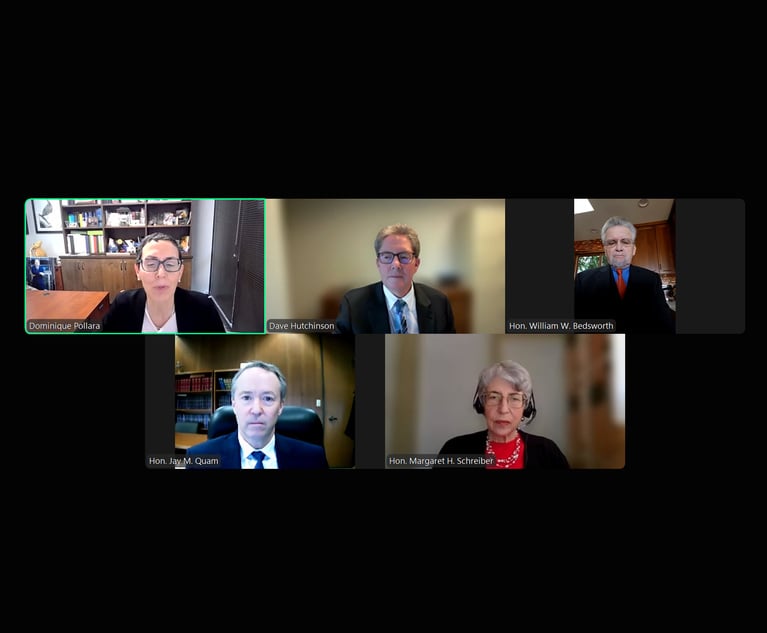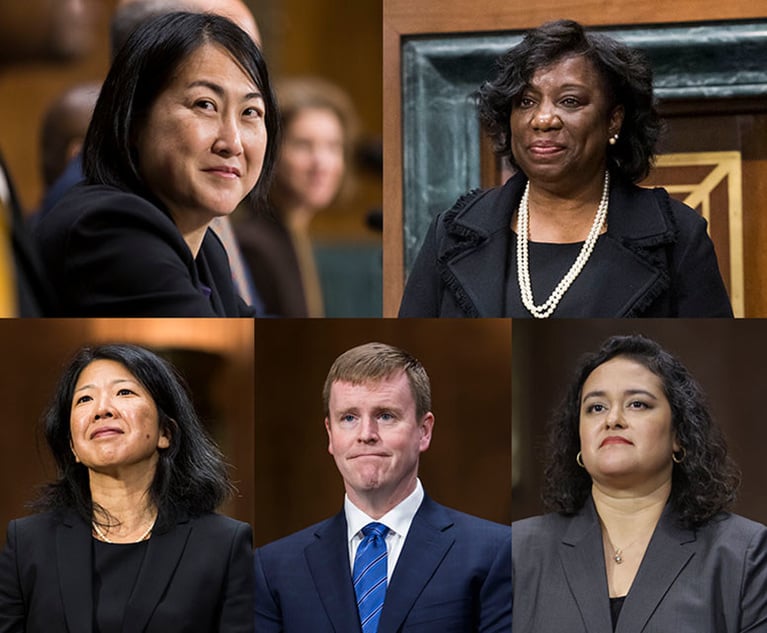 Bail Bonds in San Francsico. (Photo: Jason Doiy/ALM)
Bail Bonds in San Francsico. (Photo: Jason Doiy/ALM)California Courts Can Depart From COVID-19 Emergency Bail Rule, Appeals Court Rules
California's Fourth District Court of Appeal found that the state's courts continue to have the authority to set bail amounts and conditions on a case-by-case basis, despite an order from the Judicial Council of California setting bail at $0 for some offenses.
April 29, 2020 at 06:10 PM
4 minute read
A California appeals court ruled that judges can deviate from a $0 bail rule set by the state's judicial governing body in an effort to reduce incarcerated populations during the COVID-19 pandemic.
California's Fourth District Court of Appeal ruled in favor of the San Diego Superior Court in a case that challenged the state court's assertion that it is free to depart from Emergency Rule 4, which the Judicial Council of California adopted to establish a statewide Emergency Bail Schedule setting $0 bail for misdemeanors and some felonies.
The Superior Court implemented the rule with the caveat that it could raise the bail request to "assure the appearance of the defendant or protect public safety," but more than 100 petitioners whose bail was raised above $0 or strapped with conditions claimed the court did not have the authority to pivot from the rule on a case-by-case basis, according to the opinion published Wednesday.
However, the appeals court found that the court did indeed have that authority, and that it was not infringing on petitioners' federal or state constitutional rights.
"The Judicial Council did not intend to suspend the array of statutes governing bail, as well as the superior court's inherent authority, which allow the court to depart from the scheduled bail amount or impose bail conditions in individual cases under appropriate circumstances," wrote Associate Justice Patricia Guerrero, joined by Administrative Presiding Justice Judith McConnell and Associate Justice Richard Huffman.
The guidance was one of 11 rules the Judicial Council set amid the pandemic. On March 27, Gov. Gavin Newsom issued an executive order granting the Judicial Council unprecedented authority to enact rules to keep the courts running safely during the pandemic. As part of the order, courts must notify the sheriff's watch commander at the prospective detention facility in order to raise or change bail conditions.
The petitioners, whom prosecuting agencies in the San Diego area identified for bail raises or conditions, sought a writ of mandate asking the Superior Court to roll back its selective implementation of the rule.
In the decision, Guerrero said the rule does not unilaterally mandate $0 bail, regardless of the circumstances of a case.
"Instead, it adopts a statewide Emergency Bail Schedule, under which bail for the covered offenses is zero dollars," she wrote. "At the very least, the rule's focus on a bail schedule, which has an established meaning and function in setting bail that is not mandatory, introduces ambiguity regarding the superior court's authority to depart from the zero bail amount under Emergency Rule 4. The rule can reasonably be interpreted, as urged by the district attorney, to preserve the court's existing authority to increase bail from the scheduled zero bail amount if the circumstances and existing statutes allow such a departure."
Petitioners had argued that interpreting the rule to establish statewide bail schedules while keeping in place existing statutes for setting bail for individual defendants leads to "absurd results" because it will not reduce jail populations, according to the opinion.
Yet, the court pointed to "numerous individuals" in San Diego County who were released, "including dozens of defendants in pretrial custody and two of the three named postconviction petitioners."
"The effect of the statewide Emergency Bail Schedule is to set the presumptive bail amount at zero dollars for the covered offenses. If bail is to be set above that amount—for example, in the amount previously specified in the countywide bail schedule—it must be justified," the justices found.
This content has been archived. It is available through our partners, LexisNexis® and Bloomberg Law.
To view this content, please continue to their sites.
Not a Lexis Subscriber?
Subscribe Now
Not a Bloomberg Law Subscriber?
Subscribe Now
NOT FOR REPRINT
© 2024 ALM Global, LLC, All Rights Reserved. Request academic re-use from www.copyright.com. All other uses, submit a request to [email protected]. For more information visit Asset & Logo Licensing.
You Might Like
View All
'Serious Disruptions'?: Federal Courts Brace for Government Shutdown Threat
3 minute read
‘It's Your Funeral’: On Avoiding Damaging Your Client’s Case With Uncivil Behavior

Practice Tips From—and About—the New Judges on the Northern District of California Bench

Trending Stories
- 1Trailblazing Broward Judge Retires; Legacy Includes Bush v. Gore
- 2Federal Judge Named in Lawsuit Over Underage Drinking Party at His California Home
- 3'Almost an Arms Race': California Law Firms Scooped Up Lateral Talent by the Handful in 2024
- 4Pittsburgh Judge Rules Loan Company's Online Arbitration Agreement Unenforceable
- 5As a New Year Dawns, the Value of Florida’s Revised Mediation Laws Comes Into Greater Focus
Who Got The Work
Michael G. Bongiorno, Andrew Scott Dulberg and Elizabeth E. Driscoll from Wilmer Cutler Pickering Hale and Dorr have stepped in to represent Symbotic Inc., an A.I.-enabled technology platform that focuses on increasing supply chain efficiency, and other defendants in a pending shareholder derivative lawsuit. The case, filed Oct. 2 in Massachusetts District Court by the Brown Law Firm on behalf of Stephen Austen, accuses certain officers and directors of misleading investors in regard to Symbotic's potential for margin growth by failing to disclose that the company was not equipped to timely deploy its systems or manage expenses through project delays. The case, assigned to U.S. District Judge Nathaniel M. Gorton, is 1:24-cv-12522, Austen v. Cohen et al.
Who Got The Work
Edmund Polubinski and Marie Killmond of Davis Polk & Wardwell have entered appearances for data platform software development company MongoDB and other defendants in a pending shareholder derivative lawsuit. The action, filed Oct. 7 in New York Southern District Court by the Brown Law Firm, accuses the company's directors and/or officers of falsely expressing confidence in the company’s restructuring of its sales incentive plan and downplaying the severity of decreases in its upfront commitments. The case is 1:24-cv-07594, Roy v. Ittycheria et al.
Who Got The Work
Amy O. Bruchs and Kurt F. Ellison of Michael Best & Friedrich have entered appearances for Epic Systems Corp. in a pending employment discrimination lawsuit. The suit was filed Sept. 7 in Wisconsin Western District Court by Levine Eisberner LLC and Siri & Glimstad on behalf of a project manager who claims that he was wrongfully terminated after applying for a religious exemption to the defendant's COVID-19 vaccine mandate. The case, assigned to U.S. Magistrate Judge Anita Marie Boor, is 3:24-cv-00630, Secker, Nathan v. Epic Systems Corporation.
Who Got The Work
David X. Sullivan, Thomas J. Finn and Gregory A. Hall from McCarter & English have entered appearances for Sunrun Installation Services in a pending civil rights lawsuit. The complaint was filed Sept. 4 in Connecticut District Court by attorney Robert M. Berke on behalf of former employee George Edward Steins, who was arrested and charged with employing an unregistered home improvement salesperson. The complaint alleges that had Sunrun informed the Connecticut Department of Consumer Protection that the plaintiff's employment had ended in 2017 and that he no longer held Sunrun's home improvement contractor license, he would not have been hit with charges, which were dismissed in May 2024. The case, assigned to U.S. District Judge Jeffrey A. Meyer, is 3:24-cv-01423, Steins v. Sunrun, Inc. et al.
Who Got The Work
Greenberg Traurig shareholder Joshua L. Raskin has entered an appearance for boohoo.com UK Ltd. in a pending patent infringement lawsuit. The suit, filed Sept. 3 in Texas Eastern District Court by Rozier Hardt McDonough on behalf of Alto Dynamics, asserts five patents related to an online shopping platform. The case, assigned to U.S. District Judge Rodney Gilstrap, is 2:24-cv-00719, Alto Dynamics, LLC v. boohoo.com UK Limited.
Featured Firms
Law Offices of Gary Martin Hays & Associates, P.C.
(470) 294-1674
Law Offices of Mark E. Salomone
(857) 444-6468
Smith & Hassler
(713) 739-1250






